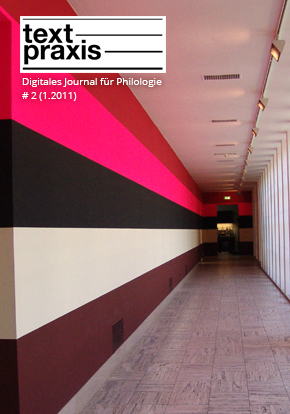Digital Journal for Philology

Textpraxis # 2 (1.2011)
In our second issue Frauke Bayer (Erlangen-Nuremberg) deals with the myth of Fontane in Günter Grass’s Ein weites Feld, Jörg Schönert (Hamburg) presents a theory of satire and Jan Decker (Leipzig) explores literary writing in his poetological essay.
The way society deals with its classical authors says a lot about their status in the cultural memory. Collectively admired and misunderstood at the same time – Günter Grass comes to this disillusioning result shortly after German reunification, in view of all-German practised forms of erecting a monument, which seem to negate the human being behind the author. Against the background of the attribution of a mythologizing function of literature Grass creates a different type of mythical admiration in his novel Ein weites Feld, published in 1995: further developing Thomas Mann’s postulate of a mythical walking-in-footsteps he manages to mirror Theodor Fontane’s life and work in the character Fonty and likewise to oppose it to the public culture of memory.
The outlined model of literary satire assumes that satirical communication within institutionalized activities of literary communication is characterized by a special functionalisation of textual system and non-textual references, which is relevant for the text structure. At the same time, the article also pursues a goal regarding the history of theory and subject and documents how in the German literary studies the subject area ›theory and history of satire‹ was linked to the international discussion in the late 1960s and during the 1970s.
The prose-writer, dramatist and writer of radio plays Jan Decker reflects in his essay on conditions and resistances of literary writing. Thereby poetological methods are less important than the questioning of conditions and dispositions which lead a person to create a literary text there, where self-perception and world touch each other. A wide range is spanned, which via eroticism and physicalness of the act of writing ultimately leads to the recognition of the »initial neurosis« as the author’s enigma one has to attend to.
